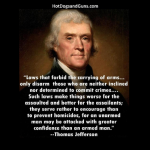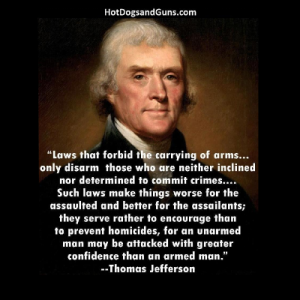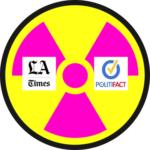Quote Check
Attributed to Thomas Jefferson:
“Laws that forbid the carrying of arms … only disarm those who are neither inclined nor determined to commit crimes … Such laws make things worse for the assaulted and better for the assailants; they are serve rather to encourage than to prevent homicides, for an unarmed man may be attacked with greater confidence than an armed man.”
Overview:
It’s wrong to attribute the quotation to Jefferson. Jefferson wrote it, but he wrote it in Italian, quoting Cesare Beccaria.
The Facts
We swiped this fact check topic from Twitter. PolitiFact uses the “politifactthis” hashtag to ask for fact check ideas. A Twitterer posted an image from HotDogsandGuns.com, asking if Thomas Jeffferson made the statement attributed to him.
Origin
This item required little research, as others have dealt with this misattribution over time. Monticello.org, a website dedicated to Jefferson, has a page addressing the problem:
This is not something Jefferson wrote, but rather comes from a passage he included in his “Legal Commonplace Book.” The passage is from Cesare Beccaria’s Essay on Crimes and Punishments.
So the quotation doesn’t come from Jefferson. It is something he wrote in the form of a quotation, albeit in Italian.
Did Jefferson endorse Beccaria’s view?
As we found with our fact check of a quotation attributed to Louis Brandeis, sometimes a dubious quotation nonetheless expresses the views of the one receiving credit for saying it.
Monticello.org notes Jefferson wrote in the margins next to his quotation of Beccaria. He simply wrote “False idee di utilità.” That phrase matches Beccaria’s description of the point he was making (bold emphasis added):
A principal source of errors and injustice are false ideas of utility. For example: that legislator has false ideas of utility who considers particular more than general conveniencies, who had rather command the sentiments of mankind than excite them, and dares say to reason, `Be thou a slave’; who would sacrifice a thousand real advantages to the fear of an imaginary or trifling inconvenience; who would deprive men of the use of fire for fear of their being burnt, and of water for fear of their being drowned; and who knows of no means of preventing evil but by destroying it.
The laws of this nature are those which forbid to wear arms …
A commonplace book serves as a personal collection of notable quotations, including those a person may wish to reference in their own later works. This, combined with his marginal note, suggests Jefferson endorsed Beccaria’s view.
Jefferson’s sympathy for Shays’ Rebellion, the 1787 Massachusetts uprising that helped spell the end of the Articles of Confederation and set the stage for the Constitution, further strengthens the impression he fully supported a right to bear arms:
Yet where does this anarchy exist? Where did it ever exist, except in the single instance of Massachusets? And can history produce an instance of a rebellion so honourably conducted? I say nothing of it’s motives. They were founded in ignorance, not wickedness. God forbid we should ever be 20. years without such a rebellion. The people can not be all, and always, well informed. The part which is wrong will be discontented in proportion to the importance of the facts they misconceive. If they remain quiet under such misconceptions it is a lethargy, the forerunner of death to the public liberty. We have had 13. states independant 11. years. There has been one rebellion. That comes to one rebellion in a century and a half for each state. What country before ever existed a century and half without a rebellion? And what country can preserve it’s liberties if their rulers are not warned from time to time that their people preserve the spirit of resistance? Let them take arms. The remedy is to set them right as to facts, pardon and pacify them. What signify a few lives lost in a century or two? The tree of liberty must be refreshed from time to time with the blood of patriots and tyrants. It is it’s natural manure.
The evidence suggests Jefferson shared Beccaria’s view of the false utility of forbidding the bearing of arms.
It’s wrong to attribute the quotation to Jefferson, but fine to point out that it appeared in Jefferson’s writings and fine to say Jefferson agreed passing laws preventing the carrying of arms were cases of false utility.
Summary
The quotation is a translation of words original to Cesare Beccaria. Jefferson wrote Beccaria’s words down in Italian, quoting Beccharia. Over time an English translation of Beccaria’s words was wrongly presented as a Jefferson original.
References
“Thomas Jefferson On Carrying Arms.” Hot Dogs & Guns. N.p., Jan. 2013. Web. 16 June 2014.
“Laws That Forbid the Carrying of Arms…(Quotation).” Monticello.org. Thomas Jefferson Foundation, Inc., n.d. Web. 15 June 2014.
Beccharia, Cesare. “Of Crimes and Punishments.” Constitution.org. Constitution Society, n.d. Web. 15 June 2014.
“Thomas Jefferson.” Ushistory.org. Independence Hall Association, n.d. Web. 15 June 2014.
“Commonplace Books.” Open Collections Program. Harvard University Library, n.d. Web. 15 June 2014.
“6. Shays’ Rebellion.” Stanford History Education Group. Stanford University, n.d. Web. 15 June 2014.
Jefferson, Thomas. Letter to William Stephens Smith. 13 Nov. 1787. Founders Online. University of Virginia, n.d. Web. 15 June 2014.
“Shays’ Rebellion.” Memorial Hall Museum Online. Pocumtuck Valley Memorial Association, n.d. Web. 15 June 2014.
Halbrook, Stephen P. “A Right to Bear Arms.” Google Books. Google, n.d. Web. 16 June 2014.
McCuaig, William. “Beccaria, Cesare Bonesana, Marquis of (1738–1794).” Encyclopedia.com. Highbeam Research, Inc., 2004. Web. 15 June 2014.
Kopel, Dave. “Gun-Free Zones.” DaveKopel.org. Dave Kopel, 18 Apr. 2007. Web. 13 June 2014.
Lund, Nelson. “The Second Amendment, Political Liberty, and the Right to Self-Preservation.” Alabama Law Review 39 (1987): 103-30. Constitution.org. Constitution Society. Web. 15 June 2014.
Kates, Don B., Jr. “Handgun Prohibition and the Original Meaning of the Second Amendment.” Michigan Law Reviews 82 (1983): 204-73. Constitution.org. Constitution Society. Web. 15 June 2014.








Not clear if Jefferson was supporting Beccaria or that he was commenting that Beccaria’s reasoning was a false idea of utility.
The Beccaria quotation itself was about false utility. It would be exceedingly odd for Jefferson to fault Beccaria’s illustration of false idea of utility by calling that reasoning itself a false idea of utility. Occam’s razor should help you figure this one out, Gary. Which view is more parsimonious?
http://www.constitution.org/cb/crim_pun40.htm
Something caught my eye in the Shay’s Rebellion quote: “…say nothing of it’s motives.” Was an apostrophe once used for the possessive form of “its”?
Though rules for English grammar have some history of fluidity, the “it’s” in the quotation is probably just the author’s mistake.
I did just enough research to find an 18th century grammar book that appears to consistently use the possessive “its” without the apostrophe.
http://www.lexilogos.com/english/english_modern_early.htm